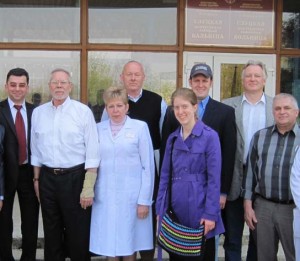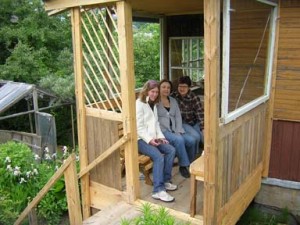By Hannah Smock ’10
On April 26, 2011 – the 25th anniversary of the world’s largest nuclear disaster at Chernobyl – I joined a delegation of Belarusians and Americans on the tarmac at Minsk-2 International Airport to welcome the arrival of a cargo plane bearing $6.2 million in pharmaceuticals and medical supplies for the survivors of Chernobyl. I was struck with the sense that there was no place on earth that I would rather have been at that moment.

Hannah Smock ’10 (fourth from right) at Slutsk Central District Hospital, Minsk, Belarus. Others include (L-R) Dr. Vladimir Navras, head doctor, Slutsk hospital; Jerry Oberndorfer, director, humanitarian programs, Office of the Coordinator, U.S. Assistance to Europe and Eurasia; head nurse, Slutsk; Dr. Mikhail Sobol, CHI country director; (wearing cap): Paul Moore II, CHI vice president and COO, CHI; Dr. Valery Fedoseev, medical program director, CHI-Belarus; Vasily Serebryany, Counterpart International.
I was there as communications intern for CitiHope International (CHI), a humanitarian relief organization. Other attendees included representatives from CitiHope, Nadezhda Express (our Belarusian partner), U.S. Department of State, U.S. Embassy in Minsk, Ministry of Health, Ministry of Foreign Affairs, Belarus Department of Humanitarian Activity, and Counterpart International.
Olga Aleinikova, head doctor at Republican Children’s Onco-Hematology Center, spoke at the event. CitiHope has been assisting her efforts since 1990 when she asked for help in obtaining needed medical supplies. She reports that survival rates for her patients have risen from 5% to 74%. The medicines delivered at this time were sent to this hospital as well as to the national organ transplant center and 10 district hospitals, providing treatment for nearly 7,000 patients.
The disastrous public health effects of Chernobyl are ongoing in Belarus, where entire communities absorbed over 70% of the nuclear fallout and 20% of the land remains contaminated.
Over the past 20 years, CitiHope has assisted the Belarusian Ministry of Health with more than $245 million worth of medicines and supplies for the nation’s hospitals.
I first traveled to Belarus in 2005 on a volunteer youth mission with CitiHope, and returned to the country in 2009 to serve a month-long field internship in Minsk with CHI and Nadezhda Express. I made many dear friends, especially my beloved host family, Dr. Mikhail Sobol, CHI Belarus country director, and his wife, Luidmila.

Hannah Smock ’10 (L-R), Luidmila Sobol (host mother), and Natasha Povarich, close friend of the Sobols at Povarich’s dacha.
I also gained an enduring love for their beautiful country and a heartfelt desire to return to my “adopted homeland.” The landscape is filled with open fields of wildflowers, many lakes, and thick, ancient forests of evergreen and birch trees. These forests provided shelter for the nation’s partisan resistance to the Nazi occupation during World War II, a conflict during which one in four Belarusians perished. Every time I hear the wind whispering through the branches in a Belarusian forest, I feel as if the trees are quietly sharing the secrets of the partisans, remembering those who loved their homeland and fought to defend it.
My experiences in Belarus strongly influenced my studies at Lafayette, and my experiences at Lafayette helped prepare me for my work with CitiHope. My desire to return to Belarus prompted me to study the Russian language, and my decision to study Russian led me to become an international affairs/Russian and East European studies double major, pursuing a deeper understanding of the history, politics, economics, and culture of the region.
Studying Russian prepared me to speak the language in both home-stay and business settings during my internship, funded by the College’s Office of Career Services. Volunteering at a home for abandoned and disabled children led me to write an honors thesis on children in the state-run residential care system in post-Soviet Russia, under the guidance of Professor Joshua Sanborn.
When a yearlong paid internship position in CHI’s program development office in Washington, D.C. became available after I graduated, I jumped at the chance and was hired. I help find new program opportunities for CitiHope in Belarus, handle communications, and provide administrative support to my colleagues in other regions of the world.
CitiHope, founded in 1985, is involved in many other parts of the world including sending supplies to hospitals in several African nations, conducting nutrition programs in Malawi and Ethiopia, running a health and nutrition program in the Dominican Republic, and improving access to health services for those displaced by ethnic violence in Kyrgyzstan. Paul Moore II, vice president/COO and son of founder Rev. Paul Moore Sr., spoke at Lafayette during ISA Extravaganza 2011.
While I don’t get to speak Russian as often as I would like, I relish every chance to participate in staff calls with Russian-speaking colleagues in Belarus and Kyrgyzstan. If I am able to realize my goal of continuing to work alongside the Belarusian people to help create a healthier future for the survivors of Chernobyl, then I hope to be speaking Russian and returning to Belarus much more in the years to come.

